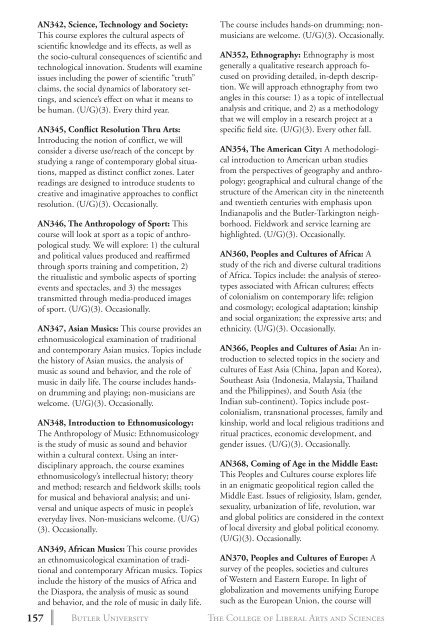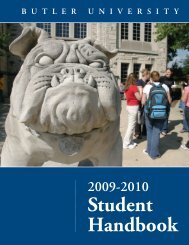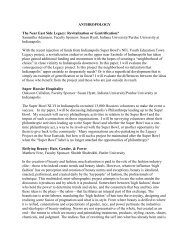2 0 1 3 bulletin - Butler University
2 0 1 3 bulletin - Butler University
2 0 1 3 bulletin - Butler University
Create successful ePaper yourself
Turn your PDF publications into a flip-book with our unique Google optimized e-Paper software.
157<br />
AN342, Science, Technology and Society:<br />
This course explores the cultural aspects of<br />
scientific knowledge and its effects, as well as<br />
the socio-cultural consequences of scientific and<br />
technological innovation. Students will examine<br />
issues including the power of scientific “truth”<br />
claims, the social dynamics of laboratory settings,<br />
and science’s effect on what it means to<br />
be human. (U/G)(3). Every third year.<br />
AN345, Conflict Resolution Thru Arts:<br />
Introducing the notion of conflict, we will<br />
consider a diverse use/reach of the concept by<br />
studying a range of contemporary global situations,<br />
mapped as distinct conflict zones. Later<br />
readings are designed to introduce students to<br />
creative and imaginative approaches to conflict<br />
resolution. (U/G)(3). Occasionally.<br />
AN346, The Anthropology of Sport: This<br />
course will look at sport as a topic of anthropological<br />
study. We will explore: 1) the cultural<br />
and political values produced and reaffirmed<br />
through sports training and competition, 2)<br />
the ritualistic and symbolic aspects of sporting<br />
events and spectacles, and 3) the messages<br />
transmitted through media-produced images<br />
of sport. (U/G)(3). Occasionally.<br />
AN347, Asian Musics: This course provides an<br />
ethnomusicological examination of traditional<br />
and contemporary Asian musics. Topics include<br />
the history of Asian musics, the analysis of<br />
music as sound and behavior, and the role of<br />
music in daily life. The course includes handson<br />
drumming and playing; non-musicians are<br />
welcome. (U/G)(3). Occasionally.<br />
AN348, Introduction to Ethnomusicology:<br />
The Anthropology of Music: Ethnomusicology<br />
is the study of music as sound and behavior<br />
within a cultural context. Using an interdisciplinary<br />
approach, the course examines<br />
ethnomusicology’s intellectual history; theory<br />
and method; research and fieldwork skills; tools<br />
for musical and behavioral analysis; and universal<br />
and unique aspects of music in people’s<br />
everyday lives. Non-musicians welcome. (U/G)<br />
(3). Occasionally.<br />
AN349, African Musics: This course provides<br />
an ethnomusicological examination of traditional<br />
and contemporary African musics. Topics<br />
include the history of the musics of Africa and<br />
the Diaspora, the analysis of music as sound<br />
and behavior, and the role of music in daily life.<br />
<strong>Butler</strong> <strong>University</strong><br />
The course includes hands-on drumming; nonmusicians<br />
are welcome. (U/G)(3). Occasionally.<br />
AN352, Ethnography: Ethnography is most<br />
generally a qualitative research approach focused<br />
on providing detailed, in-depth description.<br />
We will approach ethnography from two<br />
angles in this course: 1) as a topic of intellectual<br />
analysis and critique, and 2) as a methodology<br />
that we will employ in a research project at a<br />
specific field site. (U/G)(3). Every other fall.<br />
AN354, The American City: A methodological<br />
introduction to American urban studies<br />
from the perspectives of geography and anthropology;<br />
geographical and cultural change of the<br />
structure of the American city in the nineteenth<br />
and twentieth centuries with emphasis upon<br />
Indianapolis and the <strong>Butler</strong>-Tarkington neighborhood.<br />
Fieldwork and service learning are<br />
highlighted. (U/G)(3). Occasionally.<br />
AN360, Peoples and Cultures of Africa: A<br />
study of the rich and diverse cultural traditions<br />
of Africa. Topics include: the analysis of stereotypes<br />
associated with African cultures; effects<br />
of colonialism on contemporary life; religion<br />
and cosmology; ecological adaptation; kinship<br />
and social organization; the expressive arts; and<br />
ethnicity. (U/G)(3). Occasionally.<br />
AN366, Peoples and Cultures of Asia: An introduction<br />
to selected topics in the society and<br />
cultures of East Asia (China, Japan and Korea),<br />
Southeast Asia (Indonesia, Malaysia, Thailand<br />
and the Philippines), and South Asia (the<br />
Indian sub-continent). Topics include postcolonialism,<br />
transnational processes, family and<br />
kinship, world and local religious traditions and<br />
ritual practices, economic development, and<br />
gender issues. (U/G)(3). Occasionally.<br />
AN368, Coming of Age in the Middle East:<br />
This Peoples and Cultures course explores life<br />
in an enigmatic geopolitical region called the<br />
Middle East. Issues of religiosity, Islam, gender,<br />
sexuality, urbanization of life, revolution, war<br />
and global politics are considered in the context<br />
of local diversity and global political economy.<br />
(U/G)(3). Occasionally.<br />
AN370, Peoples and Cultures of Europe: A<br />
survey of the peoples, societies and cultures<br />
of Western and Eastern Europe. In light of<br />
globalization and movements unifying Europe<br />
such as the European Union, the course will<br />
The College of Liberal Arts and Sciences
















